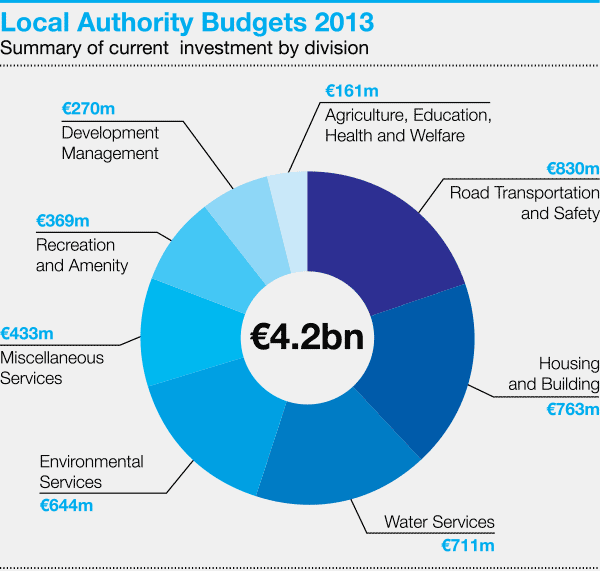Public Service Reform Plan 2014-2016
3.4 Local Government

Putting People First is based around four key principles:
[i] Doing more for the economy, enterprise and the local community: the role of local government will be strengthened with a wider range of suitable functions. Local government will have a greater role in supporting enterprise and promoting wider economic development, thereby sustaining and creating jobs. The potential of local government to play a leadership and coordination role locally will be explored, building on its role in developing sustainable communities; for example, in relation to sectors such as education, health and welfare;
[ii] Building a local government system for the 21st century: to support a stronger local government, the architecture of the system must be reflective of modern day realities and be capable of advancing the objectives of operational efficiency and representational effectiveness. Local government will have a central role in the oversight and planning of local and community development programmes. A programme of devolution of specific functions and delegation of greater responsibility will be implemented;
[iii] Local government that is soundly funded, working better and serving the community: a rigorous programme of efficiency measures, organisational streamlining and robust performance evaluation will ensure that local government is organised and operates as efficiently as possible, achieves the highest standards of performance and provides the best quality of service to the public; and
[iv] Good governance, strong leadership and democratic accountability: to strengthen and clarify governance and related aspects of the local government system, including oversight, accountability, policy development, ethics and citizen engagement, and the status and role of elected councils and their executives.
The key short to medium term priorities for the reform of local government are:
[i] Structural reform: by mid-2014, organisational rationalisation will involve a reduction in the number of Councillors from over 1,600 to some 950, and replacement of 114 local authorities with 31 integrated authorities organised on the basis of municipal districts within counties. The amalgamation of councils in Limerick, Tipperary and Waterford will be completed and the number of Regional Authorities/Assemblies will be reduced;
The Local Government Sector currently employs 28,100 staff. Staff numbers have reduced by 25% since 2008.

[iii] Funding: The Local Property Tax, which replaces the Household Charge and the Non Principal Private Residence Charge, will provide a more sustainable and resilient system of funding for local authorities and therefore a sounder financial footing for the provision of essential local services;
[iv] Delivering services efficiently: an active Shared Services programme is underway, with Shared Service Payroll/Superannuation going live early in 2014 and phased sharing of other back office business areas alongside structural change. Workforce Planning is well advanced, a voluntary redundancy scheme is available in the sector, and a sectoral Procurement Office is working with the new central structures to deliver further procurement savings. The net result of these changes will be to release resources – human and financial – for the provision of necessary front-line services in local areas;
There are 133 Civic Amenity Sites (recycling centres) and 1,900 bring bank facilities. There are also 300 Litter Wardens employed; 73.6% of areas surveyed for litter were unpolluted or only slightly polluted.
[v] Irish Water: Irish Water is being established as an independent State-owned enterprise within the Bord Gáis Éireann Group, with full transition to be achieved by 2017. A sustainable funding model, including water charges for domestic users, based on usage, which will be in place by the end of 2014, will facilitate enhanced investment in water services as well as a greater focus on water conservation; and
[vi] Accountability: a National Oversight and Audit Commission for Local Government (NOAC) will be established on a statutory basis after enactment of the enabling legislation, which is progressing through the Houses of the Oireachtas, with its enactment planned for early 2014. The NOAC will provide an independent, high quality scrutiny of local government performance in fulfilling national, regional and local mandates. The reports of the NOAC will be public and will be provided to the Minister and where appropriate, to other Ministers, and to the relevant Joint Oireachtas Committees.
[vi] Accountability: a National Oversight and Audit Commission for Local Government (NOAC) will be established on a statutory basis after enactment of the enabling legislation, which is progressing through the Houses of the Oireachtas, with its enactment planned for early 2014. The NOAC will provide an independent, high quality scrutiny of local government performance in fulfilling national, regional and local mandates. The reports of the NOAC will be public and will be provided to the Minister and where appropriate, to other Ministers, and to the relevant Joint Oireachtas Committees.
The Local Government Reform Bill published in October 2013 represents the most far reaching transformation of Local Government in the past century.
The outcome of these reforms will be to create a local government system that is fit for purpose and makes full use of its resources, capacity and potential to play as wide a role as possible in public service and administration, not only in the service areas that have been the sector’s main focus but also in contributing to national recovery and economic growth.
